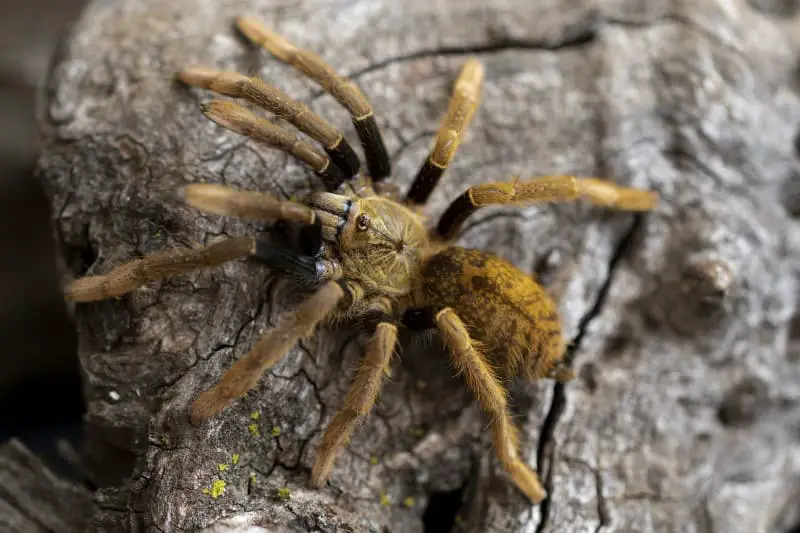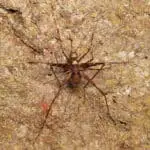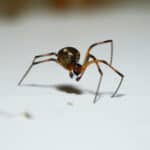The more you watch spiders, the more you realize how unique they are. But they are also very fearsome, and many people do have a deeply seated fear of spiders, so they will try to get rid of them one way or another.
But what happens if the spider runs away? Will it come back? And if it does, will it seek revenge for what has been done to it?
Do spiders try to get revenge? Spiders do not seek revenge. Spiders do not try to get revenge because they are not vengeful and not capable of feeling such emotions. They do not remember what or who has damaged their webs or tried to kill them and will not benefit in any way from getting revenge.
If you wonder what a spider will do after somebody tried to kill it or destroyed its web, then this article is for you. After reading it, you will have a better understanding of how those little creatures behave and whether or not you should really be worried about them.

Are Spiders Vengeful?
Revenge may seem like a concept that should be found in humans only. But are there actually animals that will try to get revenge if they have been hurt somehow?
Interestingly enough, there are, indeed, some animals that do try to get revenge.
For example, some primates do it. Chimpases and macaques are some of the primates that will seek out revenge and attack the offender’s weaker relatives or other random weaker animals. Elephants, bears, and tigers will also seek out revenge, by ambushing and attacking their hunters.
But what about spiders?
For a spider to come back looking for revenge, there are a few things that it has to be capable of doing.
It needs to be able to remember that you have wronged it in some way. It also needs to feel some emotion that will cause it to come back and attack you.
Although there is some evidence pointing out that some spider species can remember certain things, there is no evidence indicating that they can remember who or what destroyed their webs or that they can become vengeful because of that. So it is very unlikely for spiders to ever seek revenge.
Do Spiders Remember if You Try to Kill Them?
People with arachnophobia will definitely not feel easy if there is a spider in their homes running amok. Naturally, many will prefer to get rid of the spider and kill it. But we all know how some spiders seem to vanish into thin air.
Because of this, people will get worried if the spider will return later and bite them.
If you have tried to kill a spider and didn’t succeed, the spider will simply scurry off somewhere safe and hide for a while. Eventually, it will go about its business, looking for food, water, and a mate. Spiders are not vengeful.
The way they expend energy is also vital for their survival, so they will not spend unnecessary amounts of energy just to come back and attack you.
There isn’t any incentive for the spider to do so.
They will not achieve anything that will contribute to their survival. Not only can they get killed in the process, but they will just expend precious energy in the process, putting them at even worse odds of survival.
A spider will not remember you tried to kill it and return to seek revenge. Of course, the spider may remember that a particular area is dangerous and try to avoid it—especially if it has been an area where they didn’t get much food to begin with.
I have had a few cases where I destroyed a spider’s web by accident, and then the spider just moved to a new spot, often a safer spot, that is out of the way.
That being said, if a spider’s web has been destroyed, it can return to the same spot and rebuild its web. Spiders do that not as a way to seek revenge but because that particular spot may be a good place where they get plenty of food and water.
A spider knows that its web can get destroyed, and it is something that they have evolved to cope with quite successfully. Just because their web has been destroyed does not mean they will try to get revenge.
Do Spiders Get Angry?
Spiders don’t really feel any emotions.
Yes, spiders may act scared if something was to chase and try to kill them, but this is more a physiological response dictated by their survival instinct. So, in a way, it can be argued that they may feel something representing fear.
However, they do not feel any strong emotions for their owners or human beings in general. And in many cases, they may not even be aware of our existence at all and just consider us some random creature.
All this goes to say one thing.
Spiders do not get angry if you try to attack them, chase them away, throw them out of the window, destroy their webs, or try to capture them. They will get scared, but once you leave them alone, they will go on with their normal lives and not really dwell on any negative feelings like anger or revenge.
Spiders also do not hold grudges, so you should not worry about a spider coming back and attacking you.
Some of you may wonder, “But why then some spiders jump at me when I get close to them? Aren’t they trying to attack me?”
Here’s the thing.
A spider will not attack or bite you for no reason. To them, humans are the dominant creatures. We are bigger and stronger than the spiders, and they are smart enough to realize their disadvantage. This means that spiders will nearly always choose to run away and hide instead of directly attack us. A spider can bite you if it feels threatened and has been cornered with no ways of escaping, or it has been caught by surprise.
In this case, they may exhibit more aggressive behavior, but that is to defend themselves and does not mean the spider is angry.
Why Does It Seem Like Spiders Try to Attack You?
Spiders usually try to hide in darker places because they associate them with safety. Humans can also cast fairly big shadows that spiders can mistakenly think to be a safe spot they can hide. Many spiders also have bad eyesight and will not realize they are actually approaching a human being until they get too close. As a result, many people will be left with the impression that the spider is directly attacking them while, in reality, the spider may be seeking shelter.
On the other hand, some jumping spiders are known for their excellent eyesight and may sometimes approach humans as they can be attracted to motion and will be curious to investigate the source of said movement.
I have had a few occasions where a small jumping spider will approach me and simply stare at me while keeping its distance. If I were to make a more sudden movement, it would get scared and run away, and then as I become motionless, it will come back and look at me again.
Spiders will also not attack or bother you while you are sleeping. It is a myth that spiders will come to your bed while you sleep and bite you. In fact, the vast majority of spiders cannot even penetrate the human skin with their fangs. Humans are also not part of spiders’ natural diet, so there is no reason for them to bite you.
Read more: Do Jumping Spiders Bite
Does Killing a Spider Attract Other Spiders?
Killing a spider will not attract other spiders. Although some spiders have communal tendencies and live close to each other, there are not exactly considered social creatures. Spiders are, however, territorial, and killing a spider may lead to other spiders coming to the same area simply because the territory has been cleared.
Spiders are not like other animal species where they will collectively gather and attack the offender like, for example, bees.
This also suggests that spiders are not likely to come back and look for their dead relatives.
After all, a female spider can give birth to as much as 2,500 spiderlings. When they mature, they will spread out, often traveling more than a hundred miles. Looking back for a dead relative may not be possible for a spider.
Also read Do Pet Tarantulas Keep Other Bugs and Spiders Away?








